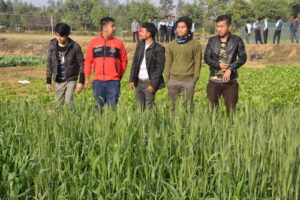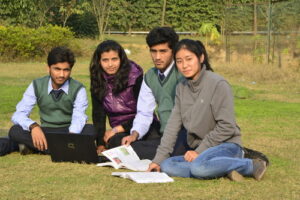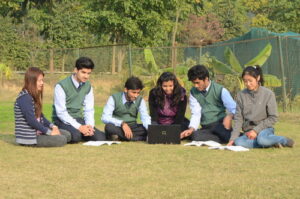BEST BSC IN FORESTRY COLLEGE IN ROORKEE
 Do you dream of a career that allows you to work outdoors, contribute to sustainability, and make a real difference in the world? If so, then a Bachelor of Science in Forestry (B.Sc. Forestry) program could be the perfect path for you. Here at Phonics Group of Institutions (PGI), nestled amidst the foothills of the Himalayas in Roorkee, Uttarakhand, we offer a comprehensive and acclaimed B.Sc. Forestry program that will equip you with the knowledge and skills to become a leader in this dynamic field.
Do you dream of a career that allows you to work outdoors, contribute to sustainability, and make a real difference in the world? If so, then a Bachelor of Science in Forestry (B.Sc. Forestry) program could be the perfect path for you. Here at Phonics Group of Institutions (PGI), nestled amidst the foothills of the Himalayas in Roorkee, Uttarakhand, we offer a comprehensive and acclaimed B.Sc. Forestry program that will equip you with the knowledge and skills to become a leader in this dynamic field.
Why Choose Phonics Group of Institutions for Your B.Sc. Forestry Degree?
When it comes to pursuing a B.Sc. Forestry degree, choosing the right college is paramount. Look no further than Phonics Group of Institutions, consistently recognized as a top college in Uttarakhand and a best college of the North. Here’s what sets us apart:
- Experienced and Renowned Faculty:Our faculty comprises passionate forestry professionals with extensive academic backgrounds and real-world experience. They are dedicated to mentoring and guiding students, ensuring a well-rounded learning experience.
- Industry-Oriented Curriculum:Our B.Sc. Forestry program goes beyond theoretical knowledge. We focus on practical applications through hands-on learning, field trips to diverse ecosystems, and guest lectures from industry experts.
- State-of-the-Art Facilities:PGI boasts well-equipped laboratories, a dedicated forestry resource center, and access to nearby forests for practical training. This ensures a stimulating learning environment that fosters exploration and discovery.
- Focus on Sustainability:Sustainability is at the core of our B.Sc. Forestry program. We emphasize responsible forest management practices, conservation techniques, and the delicate balance between human needs and environmental protection.
- Excellent Placement Record:PGI has a strong track record of placing graduates in coveted positions with government forestry departments, NGOs, research institutions, and private forestry companies.
 Unveiling the World of Forestry
Unveiling the World of Forestry
Our B.Sc. Forestry program delves into a vast array of subjects, providing a holistic understanding of forest ecosystems and their management. Here’s a glimpse into the exciting curriculum:
- Forest Ecology:Explore the intricate relationships between trees, plants, animals, and the environment. Gain insights into forest dynamics, succession patterns, and the impact of human intervention.
- Silviculture:Master the art and science of cultivating forests. Learn about plantation establishment, tree improvement techniques, and sustainable harvesting practices.
- Forest Mensuration:Develop expertise in measuring and assessing forest resources. This includes techniques for tree volume estimation, growth analysis, and forest inventory methods.
- Forest Soil Science:Understand the vital role of soil in forest health. Learn about soil composition, nutrient cycling, and soil conservation practices crucial for maintaining forest productivity.
- Wildlife Management:Explore the principles of wildlife conservation and habitat management. Gain insights into the interaction between forests and diverse fauna, and strategies to ensure their coexistence.
- Forest Policy and Law:Become familiar with the legal framework governing forest management in India. We delve into forest laws, regulations, and policies for responsible and sustainable utilization of resources.
This comprehensive curriculum, coupled with practical training, equips you with the necessary skills to navigate the diverse challenges and opportunities within the forestry sector.
 Beyond the Classroom: Practical Learning Experiences
Beyond the Classroom: Practical Learning Experiences
At PGI, we understand the importance of experiential learning. Our B.Sc. Forestry program incorporates the following to ensure a well-rounded education:
- Field Trips:Embark on enriching field trips to nearby forests, national parks, and wildlife sanctuaries. Gain firsthand experience with diverse forest ecosystems and observe sustainable forest management practices in action.
- Guest Lectures:Learn from leading foresters, researchers, and environmental activists. These sessions offer valuable insights into the current trends, challenges, and opportunities within the forestry domain.
- Practical Labs:Hone your practical skills in our well-equipped laboratories. Conduct experiments on soil analysis, wood identification, and learn essential techniques for forest assessment and monitoring.
These practical learning experiences solidify theoretical concepts and nurture a deeper understanding of the intricacies of forest management.
Career Prospects after B.Sc. Forestry
A B.Sc. Forestry degree from Phonics Group of Institutions opens doors to a wide range of rewarding career opportunities. Whether you aspire to work in government forestry services, research institutions, environmental NGOs, or private forestry companies, our program equips you with the necessary skills and knowledge to excel. Potential career paths include:
- Forest Ranger
- Forest Officer
- Wildlife Biologist
- Conservation Scientist
- Forest Consultant
- Environmental Project Manager
- Silviculturist
- Forest Researcher
- Agroforestry Specialist
With a growing global focus on sustainability,
Department Vision
To be a global leader in the development and communication of science and technology related to the understanding, stewardship, and conservation of natural systems, of which humans are an integral part.
Department Mission
Given our changing world, we work to address the challenges in natural resource sustainability through education and training, novel research, innovation, and outreach.
- To provide knowledge for conservation and scientific management of the forests and natural resources of the region.
- To meet the growing demand of forestry and environmental professionals in natural resource-based industries, government and NGO sectors.
- To strengthen the interface of academia with the government and industry and prepare the next generations of skilled and ethical professionals.
- Efforts to galvanize the academic fervour and creative instincts of the youth coming from socially and economically backward areas.
- Professional Knowledge: Apply the fundamentals and practical knowledge to solve the complex forestry/agricultural problems.
- Problem analysis: Use professional knowledge they identify, formulate and analyze complex problems reaching substantiated conclusions.
- Design/development of solutions: Design and diagnosis solutions for complex problems or processes that meet the specified needs with appropriate consideration for the public health and safety, and the cultural, societal, and environmental considerations.
- Conduct investigations of complex problems: Use research-based knowledge and research methods including design of experiments, analysis and interpretation of data, and synthesis of the information to provide valid conclusions.
- Modern tool usage: Create, select, and apply appropriate techniques, resources, and modern technology and IT tools including prediction and modeling to complex forestry activities with an understanding of the limitations.
- Ethics: Apply ethical principles and commit to professional ethics and responsibilities and norms.
- Individual and team work: Function effectively as an individual, and as a member or leader in diverse teams and/or multidisciplinary professionals.
- Communication: Communicate effectively with society at large, such as, being able to comprehend and write effective reports and design documentation, make effective presentations, and give and receive clear instructions.
- Project management and finance: To provide a deep understanding of educational research and be competent to carry out independent need-based quality field researches.
- Life-long learning: Recognize the need for, and have the preparation and ability to engage in independent and life-long learning in the broadest context of technological change.
- Use signal processing concepts and tools to provide solutions to real-time problems.
- Create, select, and apply appropriate techniques, resources, and modern technology, RS and: integrate ICT in teaching-learning and assessment process to enrich professional practice.
- To strengthen the interface of academia with the government and industry and prepare the next generations of skilled and ethical professionals.
TOP RECRUITERS



